Sign up for The Wild
We’ll help you find the best places to hike, bike and run, as well as the perfect silent spots for meditation and yoga.
You may occasionally receive promotional content from the Los Angeles Times.
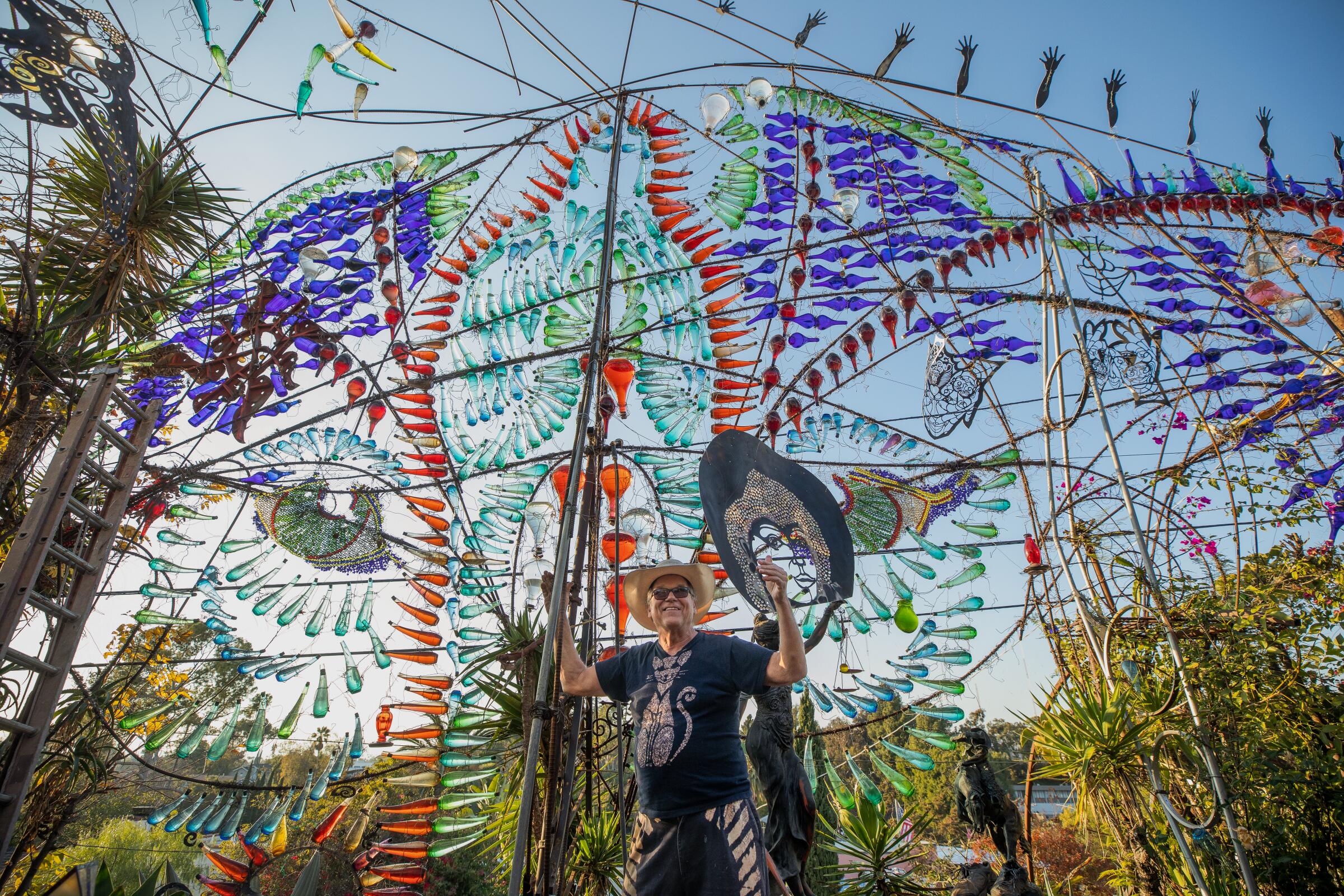
Randlett King Lawrence is the kind of guy you can only describe as a character. At 66, he’s got a face with deep-seated smile lines that crack open whenever he meets a new person. He walks around with a pocketful of clear marbles and a lowball glass filled with white wine, uttering phrases like “that’s bitchin’!” with such excitement that you can’t help but agree with him.
See "Phantasma Gloria"
Schedule a visit by sending a message to Randy King Lawrence on Instagram.
To his colleagues in the film industry, he’s a set and prop builder for movies like David Lynch’s “Mulholland Drive” (2001) and “Child’s Play 2” (1990), the second movie about a murderous doll named Chucky. But his neighbors in Echo Park know him as the man who built the “Phantasma Gloria” — his name for the massive contraption of steel rebar and more than 1,000 colorful glass bottles that looms above the front of his home on Lemoyne Street.
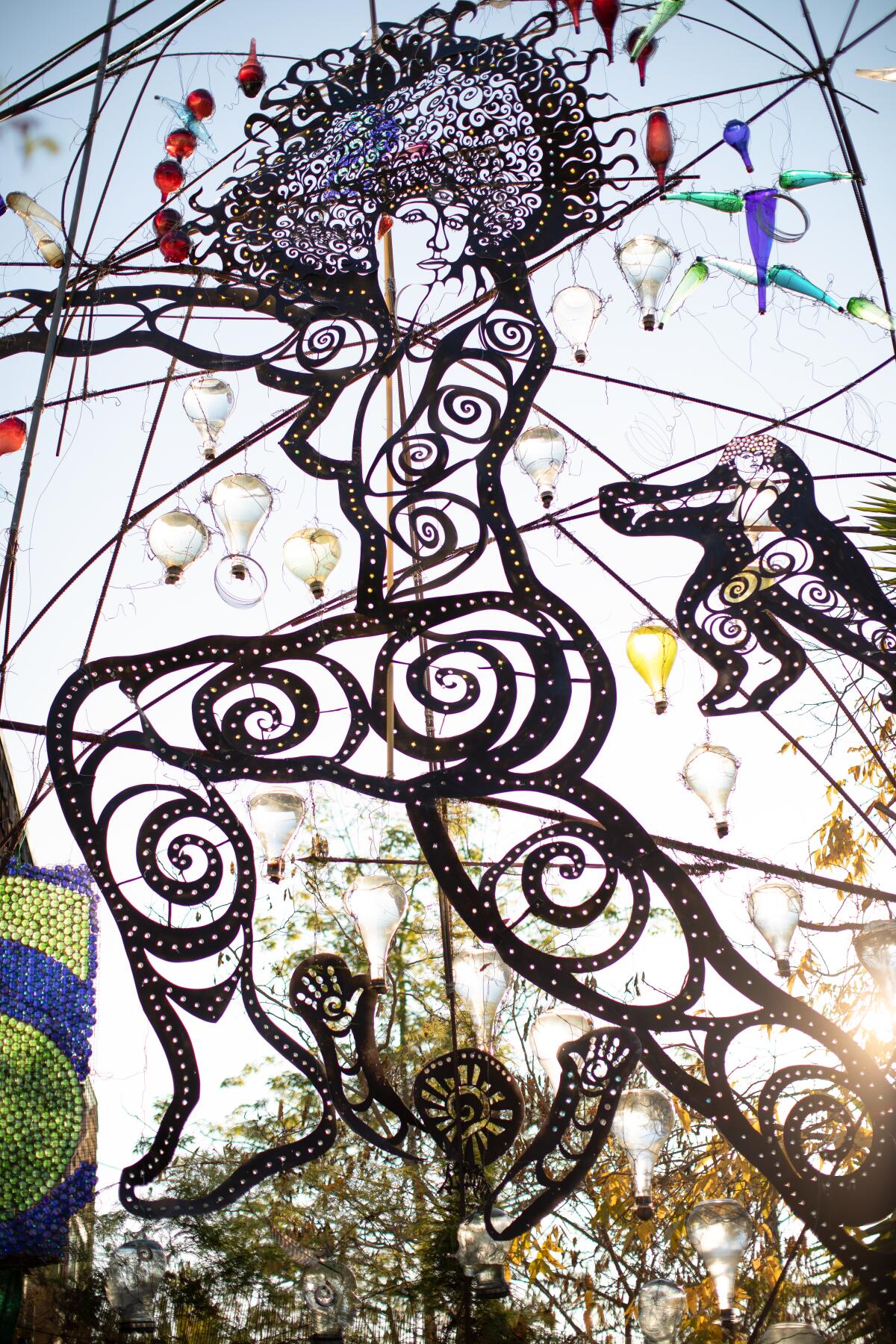
“I’m going to ask you all to go up the stairs — don’t peek to the right,” Lawrence eagerly instructed as he guided a small group from the sidewalk into his yard on a recent sunny Sunday afternoon. “And then I’m going to ask you all to turn around together.”
The view is worth a grand reveal: As the afternoon sun pours through his huge freestanding sculpture, the curved glass bottles and marbles that hang from its large steel arches glow, becoming part of a multidimensional stained glass. A cyan and lime abstraction of the Virgin of Guadalupe radiates within an outline of gleaming red bottles. The massive stencil that Lawrence calls “Bodacious Betty” lights up around the edges of her Afro from small marbles that refract like tiny stars. Some of the sculpture’s bottles are filled with water, and within those, there are hundreds of delicate renditions of the horizon flipped upside down.
“What you’re seeing now is entirely dependent upon two factors,” he said as his visitors took in the view. “One of which is what’s happening in the sky, specifically, where the light source is — the sun, or the moon, or an ambulance — and the other is how diffused the light is.”
Though he welcomes locals and strangers from around the world, Lawrence is understandably particular about when people come to visit his masterpiece. In his ideal world, everyone arrives about an hour before sunset to see the sun shine through the bottles at his favorite angles. In this way, his ongoing DIY project echoes the work of artists like James Turrell, who has built skyspaces across the country that do light shows at both sunrise and sunset to manipulate the appearance of the sky.
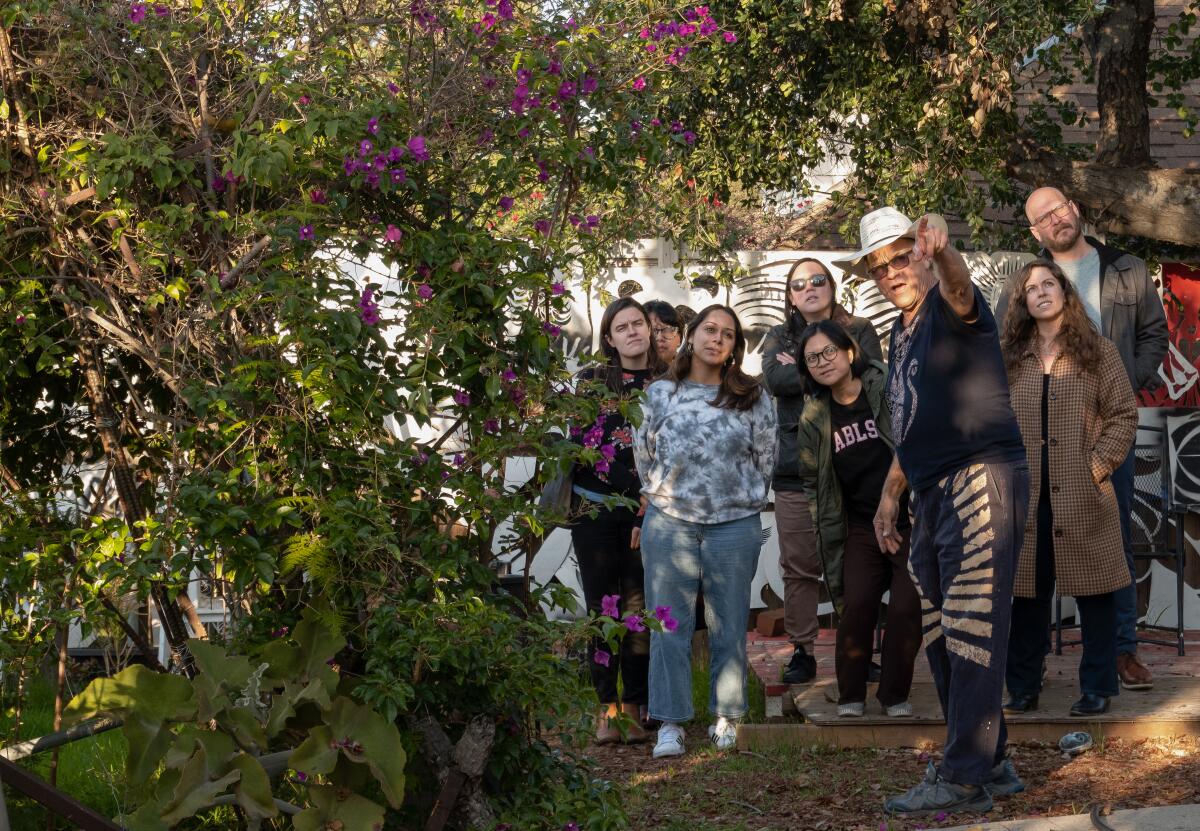
Lawrence started building “Phantasma Gloria” around the turn of the millennium, when he was “languishing in the sea of despond for the unmet yearning to create something new and beautiful in the world.” One afternoon, as he was wistfully staring at Mt. Wilson from his window, the light inside a small blue glass bottle on his windowsill caught his eye.
“So I leaned close, put on my glasses, and I saw those 10,000-foot cumulus clouds shrunken and upside down inside each one,” he said. “And that blazing blue light was the sun itself. And that’s when I realized, ‘My God, I could make mosaics out of 1,000 blazing suns.’”
Over the last 23 years, he’s built and rebuilt the sculpture numerous times and captured various photos of its evolution. As of 2023, “Phantasma Gloria” stands at about 30 feet tall and 90 feet long — about the same length as three stretch limos. Lawrence said he’s built all of it himself, aside from one friend who cleaned some of the bottles a few years ago.
There are many reasons why Lawrence invites strangers to experience the beauty of his front yard. Sometimes he likes to wax poetic about capturing thousands of stars; other times he’ll refer to the sculpture as his “low-hanging fruit” — a project so simple and natural for him that it would be a shame to not see it through.
“The ‘fruit’ is the sensual experience of life,” Lawrence said. “I’m trying to give you an idea of how the same exact array of steel and glass delivers in an endlessly changing — and often magnificently changing — visual experience.”
The spectacle of the sculpture isn’t the only thing that draws people to Lawrence’s front yard. Talking with him often feels similar to talking with your favorite art teacher or your most eccentric uncle: encouraging, odd and electrifying all at once.
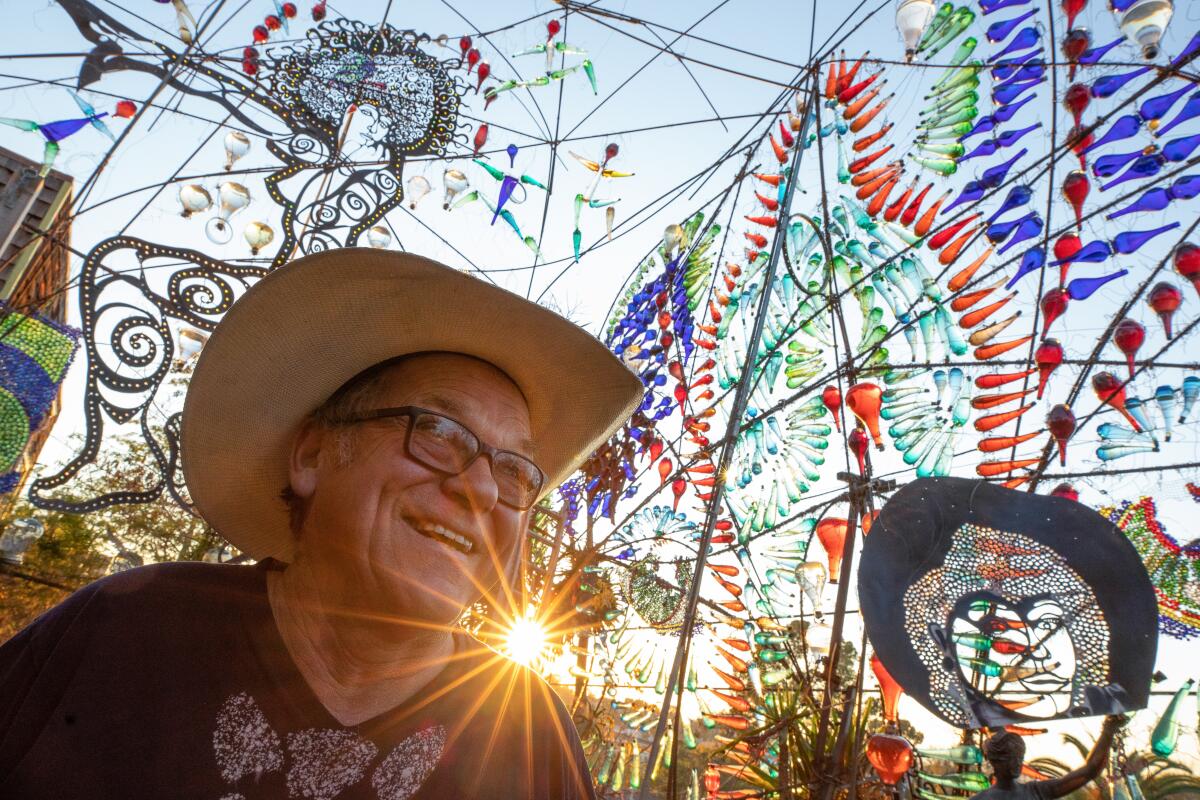
“It turns out we have two crystal balls in the front of our eyes, but they’re more lentil-shaped as opposed to spherical — that’s why they’re called lenses,” Lawrence explained one afternoon as he held a marble in front of my eye.
“And if you position the lens,” he continued, “you can make an endless number of visual experiences or images.”
Lawrence wasn’t always an artist in the traditional sense. Born on an “exotic island in New York Harbor” that most people know as Staten Island, he’s a self-dubbed Army brat whose family lived in Germany, Texas, New Mexico and Virginia before moving to California. As his father traveled to Vietnam for his work in military intelligence, his mother decided to move the family from Donner Lake, Calif., to La Jolla. There, Lawrence started to feel the urge to capture and refract beauty.
“La Jolla is so goddamn beautiful and sensual,” he said. “I spent a lot of time in the water and under the water, and I think that the psychedelics [I did] and the ocean had a big impact on my imagination.”
After graduating from UC Santa Cruz with a degree in economics, Lawrence worked as a reporter on what he calls the “bereavement beat” — writing about the recently deceased — for the Long Beach Independent Press-Telegram.
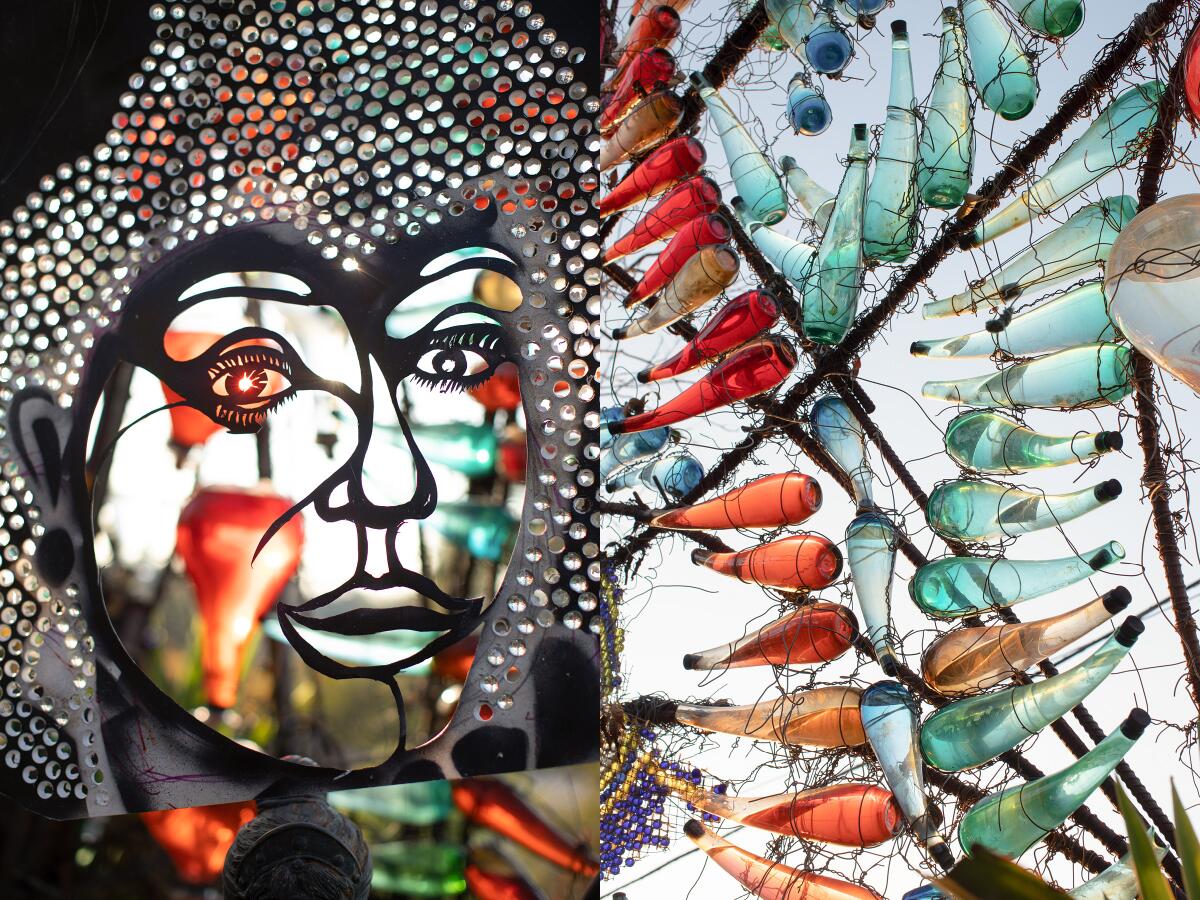
He left that job to work as an organizer for the United Farm Workers before he started managing local political campaigns and working as a writer for the Democratic whip in the California Legislature. Once he grew bored with that, he wandered around Mexico, staying afloat by importing duffel bags full of leather jackets that he resold in L.A.
In the 1980s, when he was living with a girlfriend who gave him an ultimatum of either proposing or moving out, Lawrence got a job offer from a friend to build fake spaceships for Roger Corman, the trailblazing indie filmmaker who launched the careers of Francis Ford Coppola, Jack Nicholson and Martin Scorsese, among others. That job allowed him to move out and became the start of his long-term career, working on props and set construction for TV and films.
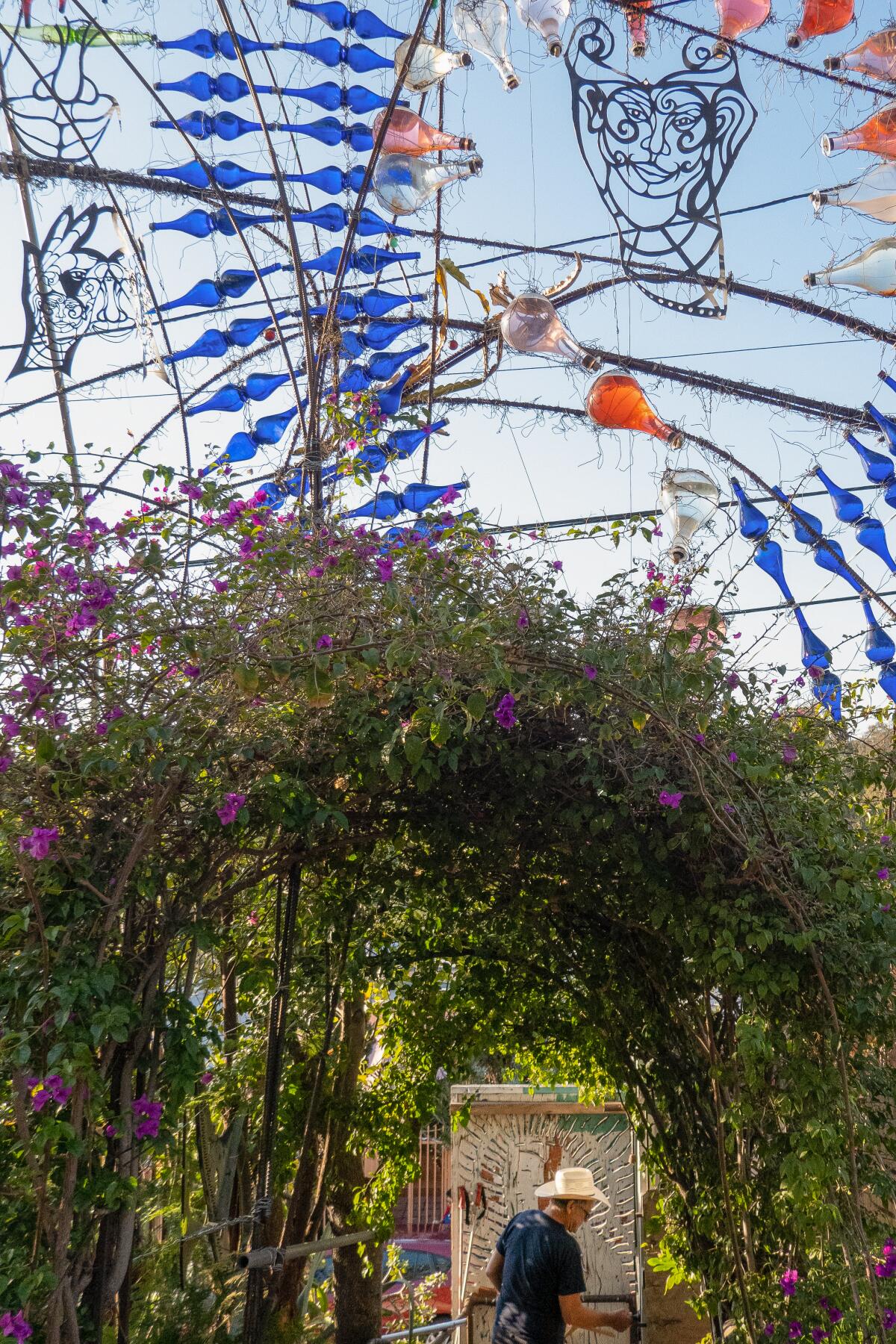
Lawrence moved into his current house on Lemoyne Street in 1991, living there for much of the time with his now ex-wife, Nicole Lawrence. They’re still close friends, and he’s particularly excited for Nicole’s next project: She’s planning to release a children’s book based on her experiences living in an artist’s home that was typically in disrepair.
“Nina lives with her artist dad in an old run-down house with a giant glass dragon in their front yard,” Nicole wrote in a draft of her book.
“Nina knows the people also see her home is old and broken,” she later adds. “The rooms have no doors, but lots of holes in the walls.”
But even in the book, the eccentric house has redeeming qualities. By the end of the story, when Nina’s friend comes to visit and comments on how cool her home is, she begins to feel proud to live there.
The story isn’t far off from reality. Lawrence first started building “Phantasma Gloria” when he was avoiding fixing a huge hole in his backyard. He knows the house could use more practical love and attention inside, but he still has plans to build a dragon in the backyard.
“If you get in the river of creativity and you stay there, you have to act on whatever your idea is — not all of them, but be acting on at least one all the time,” Lawrence said.
“When you finish it, you reflect on what you’ve done, and then the next idea will come,” he continued. “And then 20 years later you’ll think, ‘My God, my life has been so much more fun than it would have been otherwise.’”
Sign up for The Wild
We’ll help you find the best places to hike, bike and run, as well as the perfect silent spots for meditation and yoga.
You may occasionally receive promotional content from the Los Angeles Times.